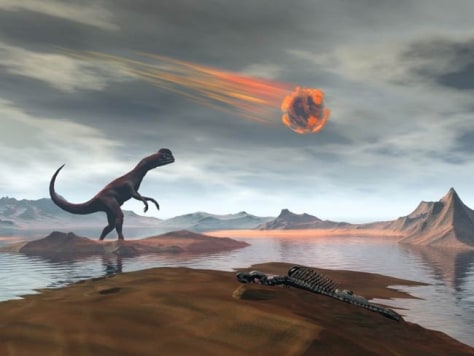Click to play embedded YouTube video.
But I recently saw a BBC documentary, which I can unfortunately no longer access, that claimed that the worst killers of terrestrial life in the history of the Earth may have come not from the sky, but from inside the Earth itself. According to this documentary, scientists have searched in vain for geological evidence for other killer asteroids than the one that ended the reign of the dinosaurs on the Earth. It could be that major asteroid impacts are really very rare, so rare that the Chicxulub impactor may have been the only one to hit the Earth with catastrophic results after complex life began flourishing on our planet.
The BBC documentary claimed that the worst recorded extinction event, the Permian-Triassic extinction event some 250 million years ago, may have been caused by tremendous volcanic eruptions. Check out this page and scroll down a bit until you come to four videos, Introduction, Permian extinction explained, Freeze and burn and Volcanic monster. The last video, which I can't play, is about evidence of the world's biggest ever eruption in the Siberian traps. According to the BBC documentary that I saw, it was this monster volcanic eruption (or series of eruptions) that caused the Permian-Triassic extinction. All right, I guess the jury is still out on that, but I found it fascinating to consider the the idea that volcanoes may cause more havoc and change planets more profoundly than asteroids. (Check out what John Lambshead wrote about the Permian-Triassic mass extinction.)
So what about Mars and Venus? The latest news about Mars says that early Mars was more likely cold and icy than warm and wet. I guess the jury is still out on that one, but it should be noted that all other things being equal, a planet that is farther away from its parent star will be colder than one being closer to the same star, because the more distant planet will receive less sunlight. So for the sake of the argument, let's assume that early Mars really was cold and icy. Then we don't have to explain why it is so cold today, because it was (almost) always cold. What we have to explain is how Mars ever could get warm enough to melt enough of its ice to produce all those dried out lake beds and river beds.
A definite possibility is asteroid impacts. But what about volcanoes? Mars has volcanoes, yes indeed. I believe Olympus Mons, seen here, might be the largest volcano in the solar system. It is extinct now, of course, but a long time ago it must have been active. Back then, it must have had titanic eruptions and released huge amounts of carbon dioxide into the Martian atmosphere, quite likely thickening it and also adding powerful greenhouse gases to the atmosphere. It may even have drawn water from the depths of Mars and released it into the atmosphere as water vapor. Couldn't such enormous volcanic eruptions have changed Mars enough to melt a lot of its ice and created rivers and lakes on the surface of the red, but temporarily semi-blue, planet?
And now consider Venus. Venus is anomalously hot, hotter than Mercury, which is closer than Venus to the Sun. One of the few things we know about the surface of Venus is that it has a lot of volcanoes. Could it be that the thick, carbon dioxide atmosphere and the hellish temperatures of our sister planet have been caused by all its volcanoes?
Click to play embedded YouTube video.





